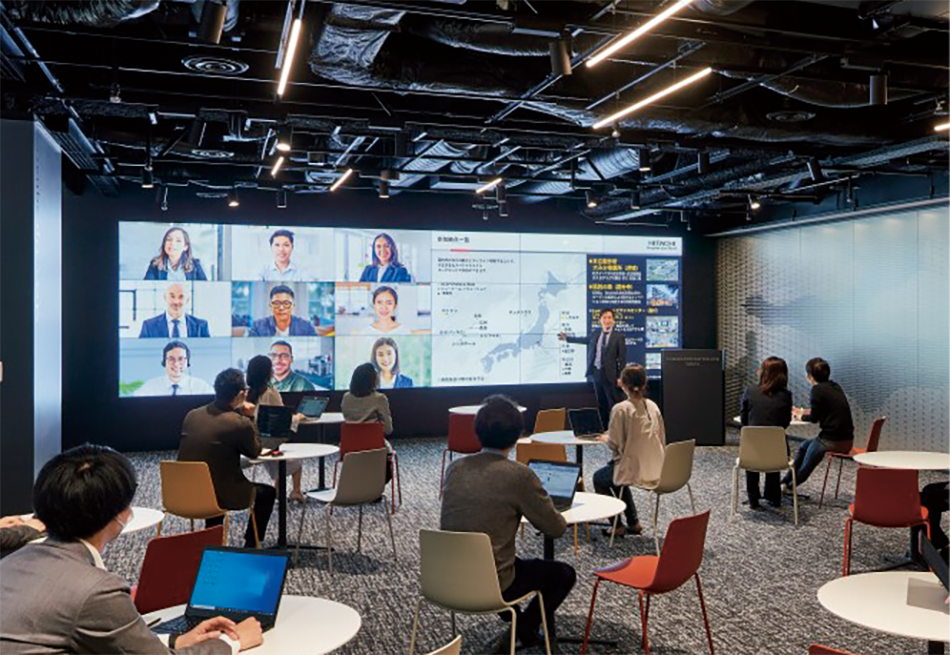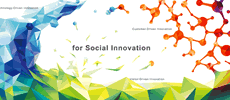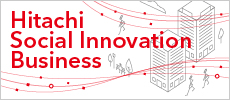COVER STORY:ISSUES“Being” as a Basis for Addressing ChallengesAI, Data, and the Role of Individuals and Companies in the Age of DX
Highlight
Confronted by a variety of challenges, climate change and the COVID-19 pandemic not the least among them, modern society is being called upon to transform itself across a wide range of areas, including in business where changes in people’s values mean that past practices no longer work.
As work style reform and DX proliferate in the post-COVID world, what is needed to be successful in such endeavors? What possibilities are opened up by AI and data as these become essential to future business? Kazuo Yano, a Fellow of Hitachi, Ltd., and Madoka Sawa, a Lumada Innovation Evangelist for Hitachi, met to discuss these questions at Lumada Innovation Hub Tokyo, a new collaborative creation center for accelerating digital innovation that opened in April 2021.
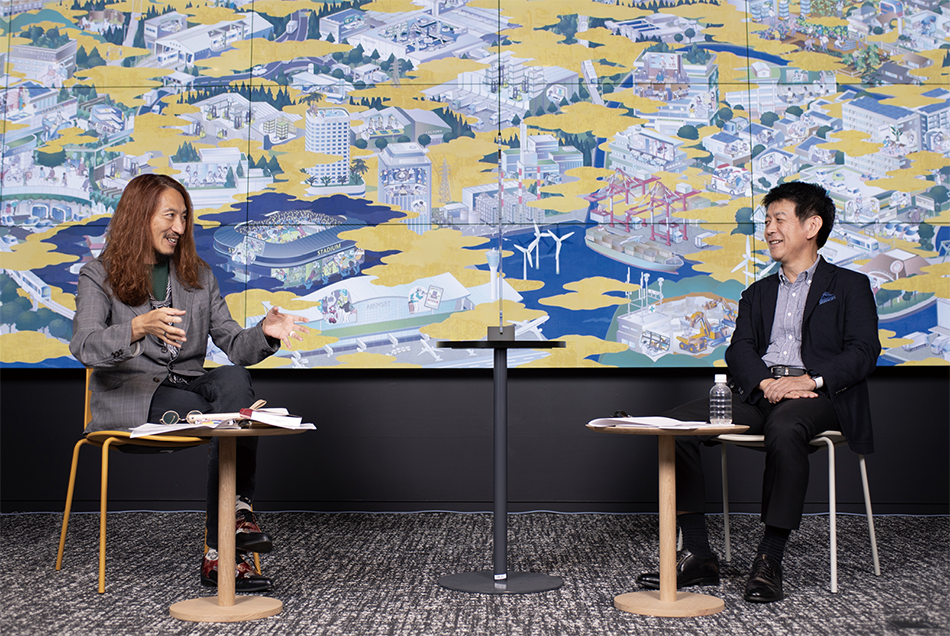
Commonalities between Hitachi and Microsoft
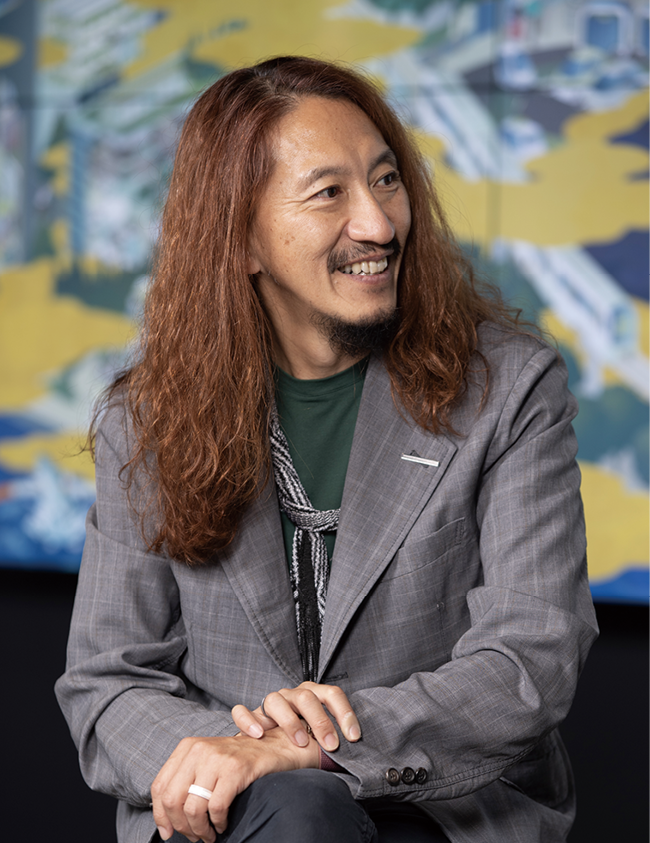 Madoka Sawa
Madoka Sawa
Representative Director, Ensow Inc.
Lumada Innovation Evangelist, Hitachi, Ltd.
Recruited by the IT subsidiary of an insurance company following graduation from the College of Economics of Rikkyo University. Joined Microsoft Corporation in 1997 where his roles included work as a consultant on information sharing systems and General Manager of the Cloud Platform Sales Department. He was appointed an executive officer in 2018 and left the company in August 2020. He commenced his work as a Lumada Innovation Evangelist for Hitachi, Ltd. in March 2021. Recent publications include “Starting from a Position of Doubt: Wellspring of Thinking and Action for Thriving in the Coming Era” (Ascom Inc.) and “The Choice to Quit” (Nikkei Business Publications, Inc.).
YanoI have been looking forward to this opportunity to talk to you today about digital transformation (DX). You were appointed a Lumada Innovation Evangelist in April 2021. What does that involve in practice?
SawaCurrently, my main role is to inform Hitachi employees and customers about Lumada Innovation Hub Tokyo. This has included opportunities to forge relationships with companies that I would not have encountered in my previous work and to start a dialogue with them about business.
YanoYou will also be working with the Kyoōsō-no-mori facility at the Kokubunji site of the Research & Development Group. Have you visited there in person?
SawaYes. Only to look around, but I found it a great place. I can see the importance of having such a facility as a research center and how it will be a valuable asset for conducting future business. I also liked the Henjin Bridge (a commemorative bridge at the entrance to the research facility). To call someone a “henjin” (an eccentric) is considered a compliment in the world of technology and research, and to have retained such a name feels like a very Hitachi thing to do. People often ask me why I quit Microsoft to join Hitachi. The truth is that, from my perspective, they are two very similar companies.
YanoThat is unexpected.
SawaWhat I feel they have in common are the breadth of their assets and the value they place on being technology-focused. From its very beginnings, Hitachi has pursued a goal of contributing to society through technology. Whether it is elevators, trains, electricity distribution, or IT, Hitachi combines its various different products to create value. This caught my interest and was one of the reasons for coming here.
YanoBoth in its research and in its operations, Hitachi offers people a higher level of freedom than might be apparent from the outside. While research work may be subject to regular stringent checks, the company takes the long view when someone comes up with something new that they want to try. As a result, it is not uncommon for innovative results to be produced in ways that did not form part of the original development objectives. From the standpoint of both Hitachi as a whole and of individual staff, I believe this freedom is something we will need to make more use of in the future.
Thinking of Oneself as Protagonist
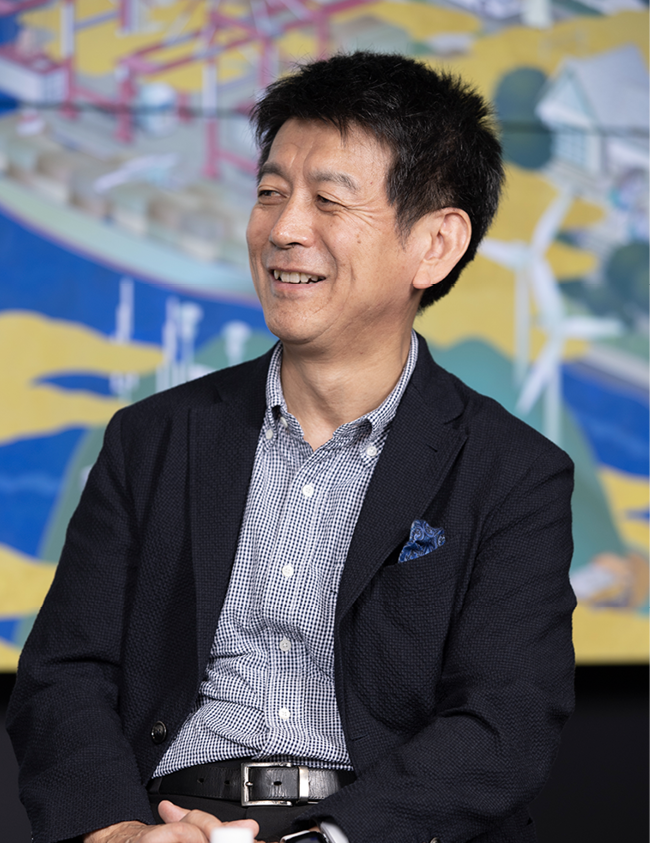 Kazuo Yano
Kazuo Yano
Fellow, Hitachi, Ltd.
Chairman of the Board and Chief Executive Officer, Happiness Planet, Ltd.
Joined Hitachi, Ltd. after receiving an M.Sc. in physics from Waseda University in 1984, taking up a position at the Central Research Laboratory. He was appointed to his current position in 2018. He is currently engaged in research into the use of data in AI and society. He founded Happiness Planet, Ltd. in 2020 with the aim of using data to enhance happiness worldwide and took up the role of Chief Executive Officer. He has a doctorate in engineering and is an IEEE Fellow. Past appointments include External Advisory Board Member of IEEE Spectrum and the Information Science and Technology Committee of Japan’s Ministry of Education, Culture, Sports, Science and Technology. He is currently a Visiting Professor at the Tokyo Institute of Technology.
YanoAn inability to free ourselves from 20th-century mass production systems is one of the reasons for the stagnation in Japan’s economy and society. The scientific management promoted by Frederick Taylor dramatically boosted labor efficiency, enabling these mass production systems and the accompanying material prosperity. However, management practices that treat people like they are part of a machine are unlikely to make workers happy, with the result that this has now become a drag on productivity. Instead, what we need is to switch to a much freer style of working like your own, where you set an objective and take responsibility for deciding how best to achieve it given the situation you find yourself in.
SawaI believe that scientific management was well suited to a time when it was possible to achieve ongoing growth by diligently completing well-defined tasks. It is onerous, however, to expect people to persevere with past processes and ways of thinking when living in a time of uncertainty. The COVID-19 pandemic has highlighted numerous societal challenges, not just working practices. I believe that overcoming these will require a “great reset” following the Internet revolution.
YanoWhat do you see as the key to resetting Japanese society?
SawaThe first is a change in attitude. The 20th-century approach of diligently completing assigned tasks can be characterized as a way of working on a collective scale. That is, it loses sight of the individual, being all about the actions of large entities, such as what the company wants to achieve or how we think as a group. What will be important in the future will be to make the shift to ways of working and living in which the individual is the one who acts, thinking in terms of “what I want to do” or “what I want to be.” I call this a “self-centered strategy.”
While Japan has started to shift from membership-based to job-based employment practices, what I have learned from working at a foreign-owned company is that the people most suited to the job-based approach are those who choose where to work based on the sort of work they want to do. Many of the people who opt for job-based employment do so because it matches the way they want to live their lives. If we are to change the employment system, we first need to increase the number of people who think in terms of thinking of themselves as the protagonist.
Something else that is important is to not get in people’s way. When you put a positive spin on it, a “henjin” (eccentric), which we spoke of earlier as being a compliment, refers to someone with creativity who refuses to stay within boundaries. I believe we will find it difficult to move beyond scientific management and increase productivity unless we can create an environment in which, instead of demanding that such people play strictly by the rules, we offer them protection, providing help when they fail and praise when they succeed. Our inability to do so may be the heart of the problem. We should start by thinking of ourselves as the protagonist, and not stand in people’s way. Were we to put these two principles into practice, I believe that Japanese society would change considerably.
Need for Abstraction and Generalization
YanoAnd Microsoft pursues job-based employment?
SawaYes. Entirely job-based. I was at Microsoft for 23 years prior to leaving August 2020 and the way that the technology was continually updated meant that the work I was doing changed as often as it would have had I changed employers. As job-based employment works by people fitting themselves in where they can be of use within the company’s operations, the skills you acquire along the way can continue to be put to use even as the nature of the work changes.
In my experience, the people who do well at work are those who think in terms of a process of moving from the specific to the abstract, then generalizing this and applying it back to the specific. An example I like to give is the Japanese athlete Dai Tamesue who started out as a hurdler. The “specific” in his case included breaking the Japan record for the hurdles and becoming an Olympian in the sport. He then drew on this experience to identify perspectives and methodologies from his time as an athlete that he could generalize in a way that made sense for business people also. That is, through this process of abstraction, he developed his own views that extended beyond sport to encompass leadership and self-management. The people who can accomplish such feats are the ones who can assign themselves to any given job.
So, this is how I respond if someone asks me for career advice. First try to express in words what your work actually entails. Carefully consider the details and nature of your work and distill it to its essence (abstraction). Ask yourself, can the essence of what you do be generalized, which is to ask can it also be applied to other, entirely different, areas? If so, why not give it a try?
YanoI understand what you mean. When my own work on semiconductor research came to an end and I took up the entirely different field of analyzing data on human behavior, I too benefitted from this abstraction and generalization. There was much that I was able to take out of my old work and reapply, including how to think about experiments, how to build human relationships, and the ability to obtain an overall impression from limited data, for example.
However, there are many people who place greater value on real-world examples rather than abstractions, something that is perhaps a characteristic of Japanese people. In the case of data and DX, which is to say the world of Lumada, abstraction is crucial.
The Abstract Encompasses the Real and Gives it Meaning
SawaThat’s right. Lumada itself is highly abstracted and that is why I have committed myself to work with it. Lumada can be thought of as the generic name for a set of tools and practices that help customers put data to use in creating value. In other words, it is all about making customers happy. While describing it that way might not be much help at explaining what it actually is, one of the great things about Lumada is that it serves as a useful keyword, bringing together a wide variety of disparate things under a single concept that encompasses them all. Another feature of Lumada is that, by being so highly abstracted, it is easier to bring together people from different fields and to address specific issues.
As I mentioned earlier, one strength of Hitachi is its possession of so many different assets. Having so many assets means that Hitachi also has acquired more domain knowledge and primary information through practical experience. This applies to customer assets as well, and while this knowledge is highly valuable, it is also something that becomes fragmented if left untouched, such that it ends up not being utilized. Lumada represents the idea of covering all of these areas so that they can be utilized, with data being the key that links this concept and its applications. The handling of data is at the core of Lumada, and given that data is something that no business nowadays can operate without, Lumada has an extremely critical role to play.
YanoWhile the real world is what it is essential, with considerable value being tied up in specific use cases, in truth these use cases have a narrow scope of application and attempting to explain one within its own context will not always make much sense to other people. It is only when it is abstracted and generalized that its scope of application becomes wider. That the abstract encompasses the real and gives it meaning is something that I hope will become more widely understood.
SawaThe reason why we use abstraction is because of customer demand. When we ask ourselves whether something is what the customer wants, the question is whether or not we can identify which of the many different specific aspects are of particular importance, and express this in terms of what it is the customer wants to do. It is impossible to get things right the first time when dealing with an uncertain business environment where there is relentless change. What works best is a backcasting approach where you think in terms of customer demand, or of a vision or such like, and this in turn calls for abstraction.
Likewise, DX should essentially equate to the abstract concept of using digital technology for transformation. DX is not something that you can sell as a package. As there is no pre-defined right answer for transformation, the only option is to think in terms of where you want to end up.
YanoAn ability to link the real with the abstract is also important.
Making “Being” the Basis of Everything
SawaThe move away from focusing on case studies is actually underway in the Master of Business Administration program at Harvard Business School. In the past, leadership training at Harvard has largely used the case study method where students learn by discussing real examples of the issues that companies face. Recognizing that this approach could not keep up with the changing times, the school has adopted a new framework based on “knowing, doing, and being.” This is the idea that, in an age when knowledge can be acquired without difficulty or cost, this knowledge is of no use without the accompanying skill of doing, and that “being” is essential to exploiting this skill at doing. That is, in a modern world full of problems with no right answers, the basis for addressing the challenges of business and society lies in the value systems and beliefs that define our purpose for living and express what sort of person we want to be.
YanoIn this context, I understand that “being” means more than just existing, and also refers to being conscious of who and what you are.
SawaThat’s right. In my book “The Power of the Individual” published in 2020, I wrote about how the future will be about faithfully seeking to actualize “being” who we want to be. In this time of abundant data and information, there are more options for “knowing” and “doing” than we could ever explore. We can easily become overwhelmed and risk losing sight of why it is we are studying or working. Nevertheless, the uncertainties will be dispelled and we can avoid putting our happiness at risk so long as we treat our “being” as the basis for how we choose to go about “doing.” One could say that the choices that make us happy are the ones we make because of what we want to become.
YanoI see. That’s an interesting perspective. Clarity of “being” facilitates “doing.” It may also be that thinking about “being” in the context of “doing” will allow us to better appreciate who we are. Which is to say the two need to be considered together in the sense that a state of “well being” enables “well doing.”
Ultimate Goal is to Make Customers and Public Happy
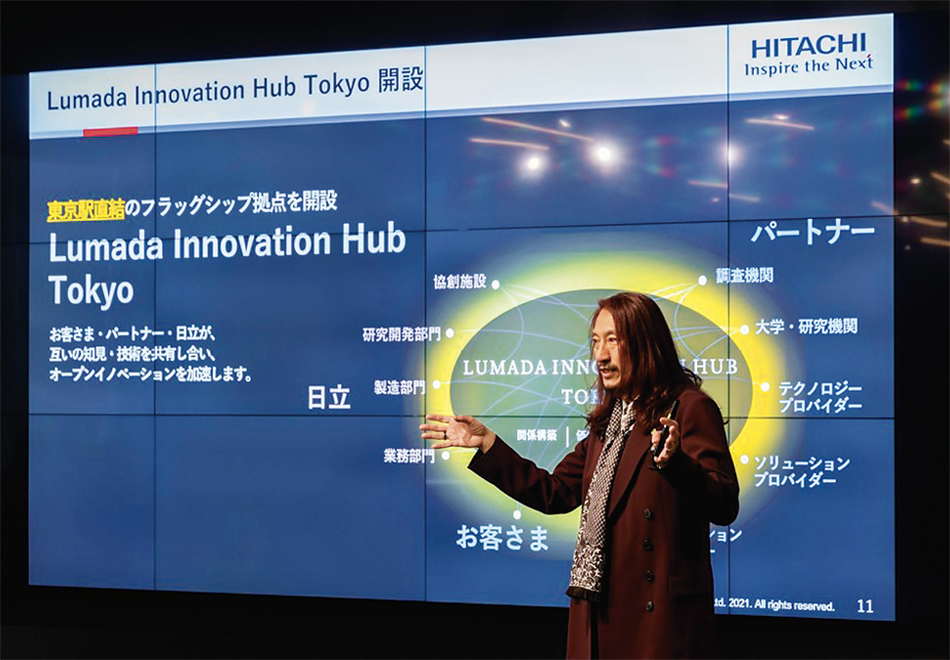 Madoka Sawa Giving a Presentation at the Opening Ceremony for Lumada Innovation Hub Tokyo (March 2021)
Madoka Sawa Giving a Presentation at the Opening Ceremony for Lumada Innovation Hub Tokyo (March 2021)
SawaTo go back to what we were talking about earlier, this approach would make job-based employment work better. This is because it would provide greater clarity in the sense of someone wanting to do a particular type of work based on what sort of person they want to be.
I often talk about how work goes best if you think of it as being like a camping trip. When people go camping together, they are likely to get annoyed if the person who is good at lighting fires does nothing more than sit back and drink beer once the fire is lit. When you are camping, it is only natural that someone who has nothing else to do once the fire is going will then help out in some other way, such as cooking. With work, however, this does not tend to happen very much and there are people who believe it is enough to stick to their own tasks.
When camping, the division of roles based on what each person is good at is ultimately in service of the higher goal of everyone getting together to have a good time. If some people fail to see it that way, and instead adopt the attitude that it is enough merely to fulfill their own role, the atmosphere at the camp is likely to suffer.
YanoAs organizations get larger, they tend to erect various barriers, with people coming to think of themselves as being sales people, for example, or engineers, whereas things would work better if they instead thought of the company as a camp and cooperated with one another.
SawaThat is how I see it. If salespeople are unavailable, there is no reason why an engineer cannot take on a sales role. What is important is to have a mindset where you ask yourself what you are able to provide, not in terms of sales figures, but on the basis of how you can be of benefit to the customer. As making the customer happy, and by extension making the public happy, is the ultimate goal of business, it seems to me that doing what you can to achieve this underpins everything else.
How to Deal with Unpredictable Change
YanoYou started out as an IT engineer. How do you feel about people’s current expectations and wariness with regard to AI?
SawaWhile it feels a bit presumptuous to talk to you about the subject, the assumption behind successful AI, and machine learning in particular, is that the future will be an extrapolation of the past. This makes it highly likely that AI will out-compete humans in applications where this is true, and it makes sense to use AI in such cases. Out in the real world, however, uncertainty is the norm and no new innovations will arise if the future is no more than a continuation of what has gone before. In other words, I foresee the work of humans as being to come up with those things that don’t feature in AI predictions.
YanoAs you say, while there are some things that can be understood through knowledge and data, data can only ever refer to the past and it is important to understand that the future cannot be predicted from past data. As I referred to in my recently published “Age of Unpredictability,” Peter Drucker wrote about how there are only two things we know about the future. The first is that it is unknowable. The second is that it will contain things that do not currently exist and that we cannot currently predict. This is obvious when you think about it. The future is something we are continually creating, not something we can foresee.
It follows that we should try to create the sort of future we want. One way I have proposed for doing so is what I call the “PPP cycle.” If we predict what will happen in the future by extrapolating from past data, reality will invariably diverge from our predictions. We can perceive these divergences and prioritize action in those areas where these differences occur. The PPP cycle refers to repeatedly working through these three steps of prediction, perception, and prioritization. The conventional plan-do-check-act (PDCA) cycle is no longer suitable for our current environment because it was not developed with the use of data for prediction in mind.
Divergences between prediction and reality also serve as indicators that anticipate change. Paying attention to such indicators so that we can act to create a better future and taking responsibility for it are both things that only humans can do. It is also the case that both AI and data can be extremely useful tools when it comes to building the future.
AI and Use of Data to Promote Happiness
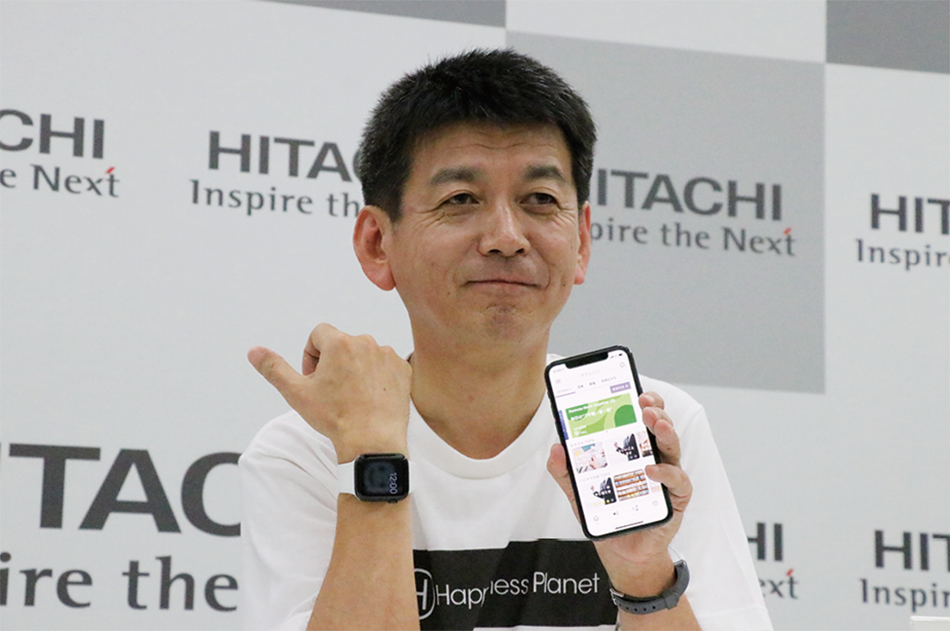 Hitachi Fellow Kazuo Yano at the Press Conference Announcing the Founding of Happiness Planet (June 2020)
Hitachi Fellow Kazuo Yano at the Press Conference Announcing the Founding of Happiness Planet (June 2020)
SawaIt is becoming increasingly important in the use of AI to think about how compatible it is with human happiness and to consider the correlations. From a computer’s perspective, data is all about zeros and ones, all of which are treated the same. Finding meaning in data on the other hand, and considering data in the light of ethics and people’s values, are things that only humans can do. This is an area that will need to be looked at very carefully in the future. While the elimination of bias is one of the principles of AI development, this is difficult to achieve in practice. If people do not pay close attention, the use of data to drive actions could in fact foster discrimination.
Given the dangers of people assuming, for example, that if some result has been produced by an AI then it must be correct, I believe we need to be proactive and approach such results with caution. We need to reach an ongoing accommodation with AI in which we continue to think for ourselves about questions like what to hold sacred and what it means to be human. That said, I expect it will be a difficult challenge, with no right answer.
YanoI agree. There is no doubt that advances in technology have expanded the scope of human thought and action, and that the extent of our influence and responsibility have expanded accordingly. This has led to interest in the ethics of technology. While the term “ethics” currently tends to refer to the criteria for judging right and wrong, the original study of ethics developed by Socrates, Plato, and Aristotle involved thinking about what constituted a good life, which is to say wellbeing, and was closely entwined with the pursuit of happiness. In those terms, consideration of the ethics of AI and other forms of technology can be thought of as also involving consideration for human wellbeing.
AI represents a new capability, and because this capability has been created by humans, we also have the responsibility to use it properly. More than ever before, we need to recognize how irresponsible it is for someone who, for example, specializes in data analytics to say that human wellbeing is none of their business.
SawaI expect that you too have been asked about what will happen as AI becomes more advanced, but the real question is not what will happen but what do you want to do about it. When it comes to living a full life, what matters is the extent to which you can focus your resources on those things you can control, because however much you fret and worry about it, there is little you can do about those things you cannot control. I believe the essence of ethics lies in “doing,” which is to say in choosing what you are going to do about the things you can control, on the basis of your own aesthetics. The ultimate cumulative effect of this should be to build a happy future for humanity.
YanoOne of the things we have learned from all the different experiments we have conducted in our research into happiness is that people who write down 20 characters or more of positive things to do each morning experience a dramatic improvement in happiness within a few weeks. This is something that we would never have discovered without collecting the data and there is no doubt that, in a data-driven society, new findings like this will emerge on a daily basis. The use of data can lead to a happy future expanding without limit. I suspect this is something that applies not just to people but also to business.
COLUMN Lumada Innovation Hub Tokyo:
Flagship Lumada Facility for Boosting Innovation
Lumada is the engine that drives Hitachi’s Social Innovation Business, the activities of which have included the announcement in March 2019 of the Lumada Solution Hub as a means of accelerating innovation that brings together digital solutions and technologies from Hitachi and its partners, following it up in November 2020 with the launch of the Lumada Alliance Program for connecting with a variety of partners from across different industries. Lumada Innovation Hub was subsequently opened in April 2021 to serve as a flagship facility for pulling people’s knowledge and ideas together.
The design concept for Lumada Innovation Hub Tokyo derives from “rakuchu-rakugai-zu” artwork: paintings done on a pair of folding screens that show the diversity of human activity in the form of scenes from across different times and places. It provides the physical space and information environment to encourage new ideas and inspiration through dialogue and to support innovation, using as a motif the impressionistic and misty “suyarigasumi” artistic technique that symbolizes how the facility brings together diverse forms of value that are created through digital transformation by the many talented people who gather there. The facility supports the process of collaborative creation, from formulating a vision to commercialization, and is equipped with five collaborative creation spaces that can also be accessed on line. These are called the Meet-Up Square, DX Gallery, Co-Creation Studio, Mirai Atelier, and Incubation Base, respectively.
These spaces draw on expertise in integrating digital practices into the collaborative creation process, which Hitachi has experimented with during the pandemic, including formulating visions and developing ideas. This supports resilient communications, providing an optimal hybrid environment that includes virtual methods as well as face-to-face and other real-world interactions.
With the aim of boosting innovation by engaging with global partners, Hitachi intends to contribute to improving people’s quality of life and to the sustainable progress of societies and economies by establishing other such collaborative creation spaces in Japan and elsewhere that follow the same concepts as Lumada Innovation Hub.

